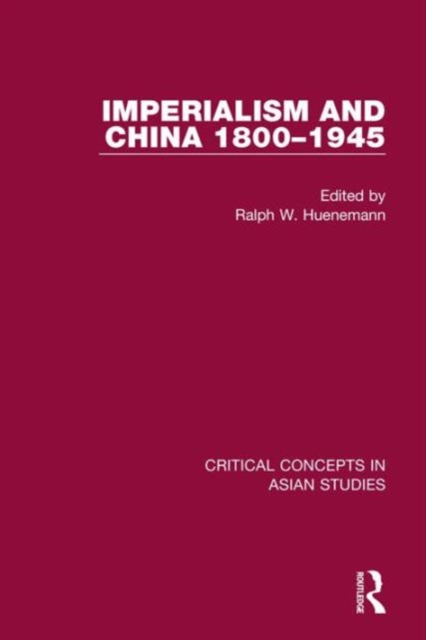
Imperialism and China 1800-1945 CC 4V Multiple-component retail product
Edited by Ralph Huenemann
Part of the Critical Concepts in Asian Studies series
Multiple-component retail product
Description
The history of imperialism in China is a complex, contentious history.
In modern times, China’s experience with imperialism has entailed two parallel stories during the 19th and 20th centuries—stories that are different in their geographic location, in their motivations, and in their outcomes.
The facet of imperialism that has received the most attention is that of aggression against China by capitalist nations, culminating in the Japanese invasion of the 1930s.
This story evolved in a low-key way before the 19th century, but then entered a more aggressive phase with military action by the British in the First Opium War (1839-1842).
Both economic issues and cultural issues have received attention in this story, and are thoroughly explored in two volumes of this Major Work.
The simultaneous story of Qing Imperialism in Eurasia (stretching from Tibet through Central Asia and Mongolia around to Korea), as explored in the third volume, entailed a multilateral rivalry, with China, Great Britain, Russia, and Japan jockeying for position.
Again, the origins lay well before the 19th century, and again significant military action was important—in this case, led primarily by the Han (Chinese) official Zuo Zongtang on behalf of the Qing (Manchu) dynasty.
An important aspect of this second story is that the territories in dispute were inhabited by non-Han peoples.
For the most part, Chinese writings do not treat this episode as an example of imperialism, much as American history books do not generally treat the incorporation of the swath of Mexican territory from Texas to California into the United States as an act of imperialism.
This reference work gathers together in one place a multitude of academic sources on the history of imperialism and China, providing an essential overview of the many sides of the topic.
Information
-
Available to Order - This title is available to order, with delivery expected within 2 weeks
- Format:Multiple-component retail product
- Pages:1570 pages, 47 Tables, black and white
- Publisher:Taylor & Francis Ltd
- Publication Date:16/05/2016
- Category:
- ISBN:9781138814349
Information
-
Available to Order - This title is available to order, with delivery expected within 2 weeks
- Format:Multiple-component retail product
- Pages:1570 pages, 47 Tables, black and white
- Publisher:Taylor & Francis Ltd
- Publication Date:16/05/2016
- Category:
- ISBN:9781138814349










